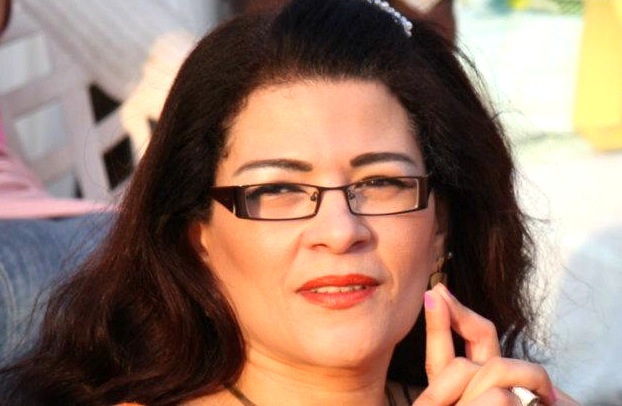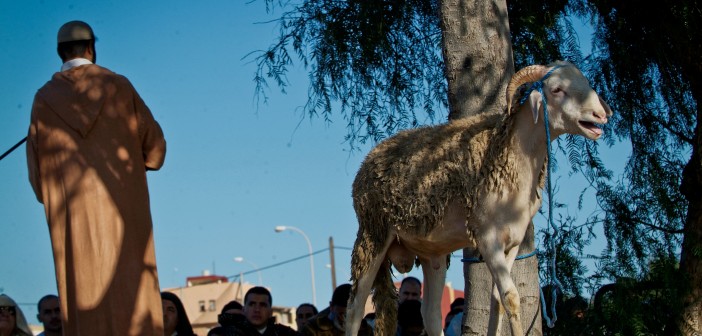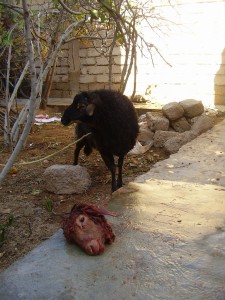(Featured image: ram awaiting sacrifice on the Eid al-Adha. Courtesy TheAnimalDay.org, used under CC BY 2.0)
On January 26th, Egyptian writer Fatima Naoot was sentenced to three years in prison and a fine of 20,000 Egyptian pounds ($2500 USD) for speaking out against animal sacrifice.

Fatima Naoot (via Wikipedia)
Every year, Muslims around the world celebrate the Eid al-Adha, the “Festival of Sacrifice,” slaughtering animals and sharing meat to commemorate the prophet Abraham’s willingness to sacrifice his son. In October 2014, Naoot acknowledged the holiday on Facebook by writing “Happy massacre, everybody,” and describing its inspiration as a “startling nightmare one of the righteous ones had about his son.” This led an Islamist lawyer to file suit, accusing her of contempt for Islam. Prosecutors took up the case against her, and Naoot was convicted under Article 98 of Egypt’s penal code on religious contempt, which states:
“Whomever exploits religion in order to promote extremist ideologies by word of mouth, in writing or in any other manner, with a view to stirring up sedition, disparaging, or contempt of any divine religion or its adherents, or prejudicing national unity, shall be punished with imprisonment between six months and five years, or the payment of a fine of at least EGP 500.”
Naoot’s punishment violates the current Egyptian Constitution, adopted in January 2014, according to which:
“Freedom of thought and opinion is guaranteed. Every person has the right to express his opinion verbally, in writing, through imagery, or by any other means of expression and publication.”
Unfortunately, legislation passed prior to the current constitution is still considered valid until ruled otherwise by the Egyptian parliament, and Naoot’s punishment is one of several recent high-profile convictions under the same law. Her lawyers are currently appealing the court’s decision.
[UPDATE: As of March 31st, 2016, Fatima Naoot’s appeal against the court’s decision has been rejected.]
To learn more about Fatima Naoot’s trial and conviction, see:
- “Blasphemy Trials on the Rise in Egypt,” Al-Monitor
http://www.al-monitor.com/pulse/originals/2016/03/egypt-lawsuits-religious-hisbah-freedom-expression.html#ixzz427KcJ3Tf - “Egyptian Poet Fatima Naoot on Trial, for Post Criticizing Islamic Mass Animal Slaughter Ritual,” The Washington Post
https://www.washingtonpost.com/news/volokh-conspiracy/wp/2015/01/29/egyptian-poet-fatima-naoot-on-trial-for-post-criticizing-islamic-mass-animal-slaughter-ritual/ - “Fatima Naoot Sentenced to 3 Years for ‘Insulting Islam,'” Daily News Egypt
http://www.dailynewsegypt.com/2016/01/26/fatima-naoot-sentenced-to-3-years-for-insulting-islam/
Besides clearly violating Naoot’s constitutional right to free speech, the court’s decision may also reveal a misunderstanding of Islam, as a number of devout Muslims have similarly criticized the practice of animal sacrifice, arguing that the Eid al-Adha can and should be celebrated without it.
Of animal sacrifice, the Qur’an proclaims “It is not their meat Nor their blood, that reaches Allah: it is your piety That reaches Him” (22:37). In the spirit of this passage, Shahid ‘Ali Muttaqi argues in his essay “An Islamic Perspective Against Animal Sacrifice” that animal sacrifice was not itself instituted by God, but adopted by the early Muslim community as a way of turning the slaughter of animals for food – necessary for survival in that time and place – into a spiritual occasion for giving thanks and sharing food with others. It is not the outward ritual, but the inner spiritual state, that is important, and since killing animals for food is no longer a necessity for most people in the 21st century, neither is their sacrifice during the Eid. He writes,
“Nowhere in the Qur’an does it suggest that people who do not need to eat meat to survive or who eat meat but do not have access to the same animals present in Arabia are somehow unable to be Muslims.
And nowhere in the Qur’an does it suggest that sacrifice is meant for any purpose other than to thank Allah for that which we have sometimes been obliged to kill, or as a personal sacrifice of something that is considered a possession in order to share it with our more needy neighbors, etc.”
The late Anila Muhammad, former head of Muslims for Progressive Values Toronto and co-founder of Universalist Muslims, concurs with Muttaqi in her article “Should Muslims Reconsider Animal Slaughter on Eid?” Going into more extensive detail as to the cruelty associated with Eid slaughter, she notes that the majority of animals sacrificed in the Middle East are imported from distant countries such as Australia, New Zealand, and Brazil, tightly packed into ships where they suffer for weeks with little or no food or water, surrounded by their own piling excrement. Many die of dehydration or malnutrition, including infants born during the journey.
Footage from a ship carrying 5,000 cows from Brazil to Lebanon, which capsized and sunk on October 6th, 2015
Such treatment is entirely incompatible with the teachings of Islam, which demand that animals be treated with compassion. On her blog Green Creation, Rianne Ten Veen quotes the Prophet Muhammad as saying “Whoever kills a sparrow or anything bigger than that without a just cause, God will hold him accountable on the Day of Judgment.” While Islam permits the killing of animals for food, it prescribes strict conditions for humane slaughter: animals cannot be too young, they must be given ample food and water beforehand, cannot be slaughtered in sight or hearing of fellow animals, and should be killed in a comfortable position as quickly and painlessly as possible.
The Hadith, or sayings of the Prophet, contain numerous stories of him speaking out on behalf of abused animals: telling a camel’s master not to keep her hungry or tired; stating that anyone who mutilates an animal for fun is cursed by God; forbidding the branding or striking of animals’ faces; allowing snakes to be killed only when they pose a serious threat; criticizing the destruction of anthills, “nations that glorify Allah;” and praising a prostitute forgiven her sins by Allah for giving water to a thirsty dog.
Directly addressing whether or not animal sacrifice is required for Muslims, one Hadith even records:
A man said, “O Messenger of Allah, I would have slaughtered a sheep but I had mercy on it.” The Messenger of Allah, peace and blessings be upon him, said, “If you had mercy on the sheep, then Allah will have mercy on you twice.”
Anila Muhammad cites the opinion of a leading Islamic scholar, Al-Hafiz B.A. Masri, that even if an animal is slaughtered perfectly according to the strict rules of Islam, if he has been subjected to cruelty beforehand his meat is haram (forbidden) for consumption. In reality, once they arrive at their destinations many sacrificial animals are killed in brutal ways entirely incompatible with Islamic regulations. This may be due to their killers’ ignorance of their religion, inexperience with slaughter (for households that perform the sacrifice themselves), or demand to kill many animals as quickly as possible (for professional butchers tasked with doing so). By Masri’s interpretation, the vast majority of meat produced during the Eid is therefore actually forbidden to consume.
- Although Islamic law requires animals to be kept in a comfortable position, this cow has been tied up on her side before slaughter (photo credit: Georgette Tan, used under CC BY-NC-ND 2.0)
- Severed head left in sight of a live sheep, a serious violation of Islam’s humane slaughter rules (photo credit: David Young, used under CC BY-ND 2.0)
Considering that Islam does not require animal sacrifice, and that the festival as practiced today inflicts enormous suffering contrary to its values, a strong case can be made that Muslims would better serve their religion by giving up the slaughter of animals and performing the Eid al-Adha as a vegetarian festival instead. Shahid ‘Al Muttaqi, Anila Muhammad, Rianne Ten Veen, and Al-Hafiz B.A. Masri make compelling arguments to this effect.
Far from deserving punishment for “insulting Islam,” perhaps Fatima Naoot should be celebrated by religious authorities, for defending the religion’s true spirit against the brutality of a long-corrupted practice.
__
More information on Islam and animals:
Animal Welfare in Islamic Law, a comprehensive guide written by Dr. Kristen Stilt and endorsed by Al Azhar University, available as a free PDF download
http://www.animalpeoplenews.org/special/STILT/stilt.islamicLawEN.pdf
Shahid ‘Ali Muttaqi’s “The Sacrifice of ‘Eid al-Adha:’ An Islamic Perspective Against Animal Sacrifice”
http://www.islamicconcern.com/sacrifice01.asp
Anila Muhammad’s “Should Muslims Reconsider Animal Slaughter on Eid?”
http://www.huffingtonpost.ca/anila-muhammad/animal-muslim-eid_b_1971072.html
Rianne Ten Veen’s “Islam and Animals,” Green Creation
https://greencreationweb.wordpress.com/2014/10/04/islam-and-animals/
Al-Hafiz B.A. Masri’s “Animals in Islam,” a very thorough overview of the subject addressing slaughter and sacrifice as well as many other issues such as fur, vivisection, and protection of the environment
http://www.call-to-monotheism.com/animals_in_islam__by_al_hafiz_b_a__masri
Two essays by scholar Norm Phelps, a practicing Buddhist who is nonetheless an academic expert on Islam: “Eid al-Adha: Sacrifice in Islam” and “Islam and Animal Rights”
http://newageislam.com/NewAgeIslamArticleDetail.aspx?ArticleID=3631
http://newageislam.com/NewAgeIslamArticleDetail.aspx?ArticleID=2230
Syed Rizvi’s “Animal Sacrifice or Blood Orgy?” on New Age Islam, further discussing the significance of sacrifice and linking to outside resources, including several of the above
http://newageislam.com/NewAgeIslamDebate_1.aspx?ArticleID=3706
Arwa Aburawa gives an interesting, somewhat contrary perspective in “Eid al-Adha: The Muslim Festival of Meat?,” in which she acknowledges the merit of vegetarianism but argues that, for the majority of Muslims who will not give up meat, it is better to at least butcher animals themselves than to buy commercially available meat from factory farms
http://www.greenprophet.com/2010/10/eid-al-adha-mea/








